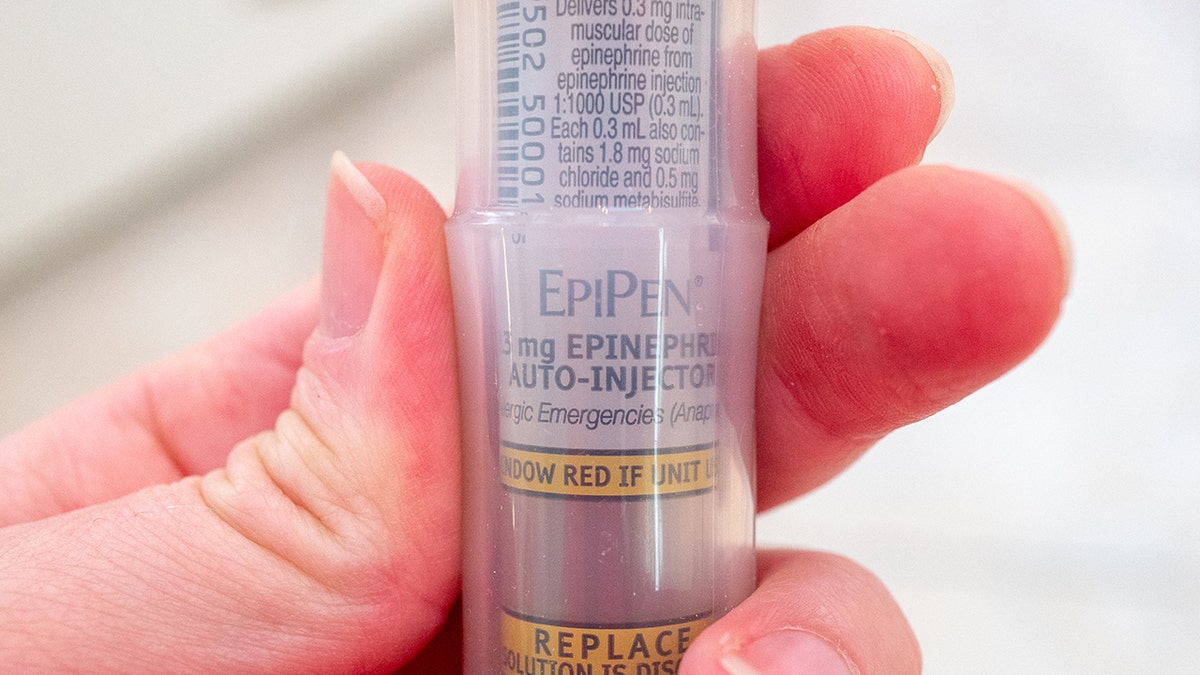Fox News Flash top headlines for January 17
Fox News Flash top headlines are here. Check out what's clicking on Foxnews.com.
The sesame-allergic community isn’t happy that some food brands and manufacturers are creating "workarounds" when it comes to sesame as a product ingredient.
The FDA officially named sesame the ninth major food allergen in the U.S. effective Jan. 1. The industry was expected to comply with new guidelines that called for clear labeling on products.
Instead of spending the time and money to ensure that manufacturing lines were sesame-clean if sesame wasn't a listed ingredient, some brands and food makers opted instead to add more sesame to their items.
This not only gives those who are sesame-allergic fewer food options, say concerned parents — it poses a growing threat, as companies appear to be refusing to prioritize the customers who suffer from the potentially life-threatening allergy.
A Chicago mom of two, Beverly (who asked for her last name to be withheld), told Fox News Digital in an interview that these workarounds to the new law are more than personal.

A child enjoys a sesame-covered snack. "Allergy moms can’t get the word out fast enough that [some] companies are threatening the lives of our kids," one mom insisted. (iStock)
Her son struggles with a severe allergy to sesame.
"Allergy moms can’t get the word out fast enough that these companies are threatening the lives of our kids," she said.
‘We’re feeling frightened'
The decision these companies are making to add more sesame is "not in the spirit" of the FASTER Act, said Beverly.
The 2021 Food Allergy Safety, Treatment, Education and Research (FASTER) Act was meant to help "keep people with allergies safe," she added.
WHAT TO DO IF YOU GET AN ALLERGIC REACTION: SYMPTOMS, CAUSES AND PREVENTION
"What if companies started putting poison in your food that could possibly kill your children? You would feel attacked. You would feel scared," she said.
"And that's how we're feeling," she continued.
"We're feeling scared. We're feeling frightened. We're feeling hurt that companies are doing this just to keep their costs down."

Beverly and her three-year-old son, who suffers from a severe sesame allergy, are shown here. "We're feeling hurt that companies are doing this just to keep their costs down," she said. (Beverly)
Erin Malawer, executive director of AllergyStrong, an allergy advocacy group in Washington, D.C., told Fox News Digital that many families are feeling "betrayed" by brands they trusted.
"If this were peanuts and this was happening, everyone would be outraged," said Malawer, who is also the mother of a son with a sesame allergy.
"So now we're finding foods that were traditionally safe for our family we can no longer have."
"So, the fact that we're adding sesame and quietly … [and that] no one cares is really frustrating," she added.
"We’d like to see the FDA do more."
Living with a sesame allergy
Both of the women's families stay completely away from sesame in order to ensure that their sons remain safe.
Beverly described navigating the allergy as "very tricky."
MANY FIRST REPORT PEANUT ALLERGY SYMPTOMS IN ADULTHOOD, STUDY FINDS
She said her family has been working around the allergy ever since her son’s diagnosis at six months old.
This includes calling restaurants and food companies ahead of time, said the mom, to confirm that there are no traces of sesame in their products.

Beverly's kids enjoy ice cream at Culver's — a restaurant the Chicago family said it can no longer patronize due to the sesame content in its menu items. (Beverly)
And now that some menus are changing to include more sesame in food items, Beverly explained that parents must be extra careful — and start the screening process all over again.
'Devastated' by certain actions
"We were very excited to give [our son] new foods that before were too vague [in terms of ingredients] to give him," said the mom. "We were excited that we would have a yes or no answer."
She added, "You can imagine how devastated we were when the companies started working around the FASTER Act, which was meant to help families like mine … adding the allergen that is life-threatening to so many people just to bypass a health regulation."
She also said, "So now we're finding foods that were traditionally safe for our family we can no longer have."
Fox News Digital reached out to the FDA for comment in light of consumer concern over adding sesame to products.

Baked goods incorporating sesame seeds are shown here. One mom said the amount of reeducation now required for sesame-allergic people to stay safe is "enormous." (iStock)
In an earlier statement, the agency said that it "does not support" the workaround by certain brands, but that these brands are technically not disobeying the law, it told Fox News Digital.
Malawer agreed that the amount of reeducation it will require for people to stay safe is "enormous."
Sesame oil, paste and flour are "much more allergenic" than whole sesame seeds — and these ingredients don’t improve the quality or taste of products, she said.
"As soon as you add sesame, you've made the decision that it's not safe for me anymore."
"They're adding a more potent version of it to their products, not just adding sesame," she said.
"Meaning that accidental exposure, which is likely to happen, could very realistically trigger a reaction."
PEANUT ALLERGY COULD BE TAMED IN SOME KIDS USING ORAL IMMUNOTHERAPY: STUDY
The incorporation of sesame flour into bread and sesame oil in other recipes has "greatly limited" her family’s ability to eat out, said Beverly.

A mom named Beverly, whose son is shown on left, called shortcuts to new FDA guidelines requiring clear labeling of sesame in food products a "threat" to America's children. (Beverly)
"Our family's almost in a lockdown mode where we're not even trying to eat out right now until everything is kind of settled," she said.
"The questions are just too complicated sometimes for people that are working a register," she also said.
‘We’re stuck'
Beverly of Chicago belongs to an online sesame community. She said people are posting about "more and more" products or brands every day that were previously safe for those who are allergic — but now contain sesame.
Restaurant chains such as Domino’s, for example, now list sesame as an ingredient in all of its pizzas.
Beverly mentioned that Pirate’s Booty, once one of her son’s favorite snacks, is now labeled that it may contain sesame, too.
Fox News Digital reached out to Domino's corporate headquarters and to the manufacturer of Pirate's Booty, The Hershey Company, for comment.
In an email reply, Todd Scott, senior manager of communications for The Hershey Company, told Fox News Digital, "I’ve checked with our experts and confirmed that Pirate's Booty does not contain sesame and is not labeled as 'may contain sesame.'"

A stack of Domino's pizzas in Spring Township, Pennsylvania, are shown on July 10, 2020. (Ben Hasty/MediaNews Group/Reading Eagle via Getty Images)
And though there may be no change to the recipe, Beverly suggested these companies only claim their products contain sesame to "protect themselves from liability."
Malawer confirmed that many of her constituents nationwide have also been having issues finding "any" sliced bread or buns that are safe.
"And that is exactly opposite of what this law was intended to do," she said.
Malawer said it feels wrong to her for companies to make decisions for families by changing recipes and adding sesame — instead of having clear labels that indicate a food item was made on equipment that may contain traces of sesame.

AllergyStrong executive director Erin Malawer and her family. She wrote recently on LinkedIn, "A reminder that the latest trend of adding allergens to products rather than clean manufacturing lines properly isn’t new. And it isn’t illegal either. But it’s against the spirit of the law," she added, referencing the FASTER Act in regard to sesame. (Erin Malawer)
"As soon as you add sesame, you've made the decision that it's not safe for me anymore," she said.
"Something doesn't feel right about that."
She added, "It's not in their customers' best interest and, these days, that just doesn't fly anymore."
NEW COVID OMICRON SUBVARIANT XBB.1.5 IS ‘SPREADING LIKE WILDFIRE’ IN US: HEALTH EXPERTS REVEAL WHY
Malawer encouraged the FDA to clarify compliance with new guidelines since the interpretation and response have differed from brand to brand.
"When you see your child turning blue, gasping for air, you see the power of a very small amount of allergen."
"Until the FDA comes out to clarify this, I just think that we're stuck," she said.
‘Very severe reaction’ to a small seed
As the mother of a 17-year-old boy who suffers from multiple food allergies, Malawer said an allergy diagnosis of any kind "upends your world."
Even as an allergy professional, the mom said she learns something new about the condition "every day."
"You have to keep yourself safe as much physically as you do psychologically," she said.

AllergyStrong executive director Erin Malawer's oldest son (far right) suffers from multiple severe allergies. (Erin Malawer)
"And that is also, as a parent, really, really tough because it's a really big burden."
Malawer described one instance when her son had an accidental exposure to sesame oil as "simply awful."
ALLERGIC TO CATS? WHAT ALLERGY SUFFERERS SHOULD KNOW BEFORE BRINGING HOME A FELINE FRIEND
"When you see your child turning blue, gasping for air, you see the power of a very small amount of allergen," she said.
"It's often a subtle allergen that many people may not realize can be life-threatening."
"If [my son] could trade one allergy out, he would tell you every time sesame because people don’t understand it."

Chicago mom Beverly watches as her children make their own sourdough bread at home. (Beverly)
Beverly’s son, who’s now three years old, had his first severe reaction after eating tahini.
The doctors told Beverly that a second exposure could be life-threatening.
"It is a very severe reaction and that's why this is so scary," she said.
An allergist's advice
Allergist and immunologist Dr. Purvi Parikh of New York explained just how scary an allergic reaction to sesame can be in a phone call with Fox News Digital.
"We've been seeing the increase in sesame allergy over the last few years, if not decades," Parikh said.
"And it's often a subtle allergen that many people may not realize can be life-threatening."

Dr. Purvi Parikh, allergist/immunologist with Allergy and Asthma Network in New York, encouraged those who are allergic to certain foods or ingredients to "really advocate" for themselves. (Dr. Purvi Parikh/NYU Langone)
Parikh encouraged the sesame-allergic community to "really advocate" for themselves and speak out as ingredients shift under these new parameters.
Patients should consider nailing down an emergency action plan with their doctor.
The allergist also recommended that people always carry emergency medicine, including two EpiPens or other epinephrine devices.
CLICK HERE TO SIGN UP FOR OUR HEALTH NEWSLETTER
"Nothing bad can happen from using an EpiPen," she said.
"The medicine is so short-lived, it's out of your system within 10 minutes, 30 minutes."

Close-up of an EpiPen logo on an epinephrine auto-injector held in a person's hand, Feb. 17, 2021. (Smith Collection/Gado/Getty Images)
"So even if you're in doubt, it's actually much safer to use it than not to use it … because epinephrine is the only thing that can stop a reaction dead in its tracks."
Patients should consider nailing down an emergency action plan with their doctor, she added, detailing what to do and how to recognize an allergic reaction.
Parikh shared that an allergic reaction, or anaphylaxis, can best be indicated with skin symptoms accompanied by another bodily reaction.
CLICK HERE TO GET THE FOX NEWS APP
This can include skin itching, swelling or redness in addition to trouble breathing, wheezing, stomach cramping, nausea, dizziness and other symptoms, she said.





















